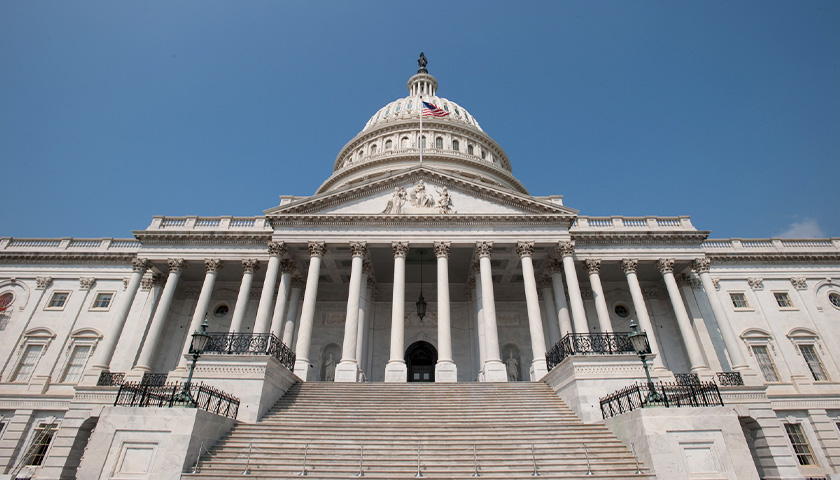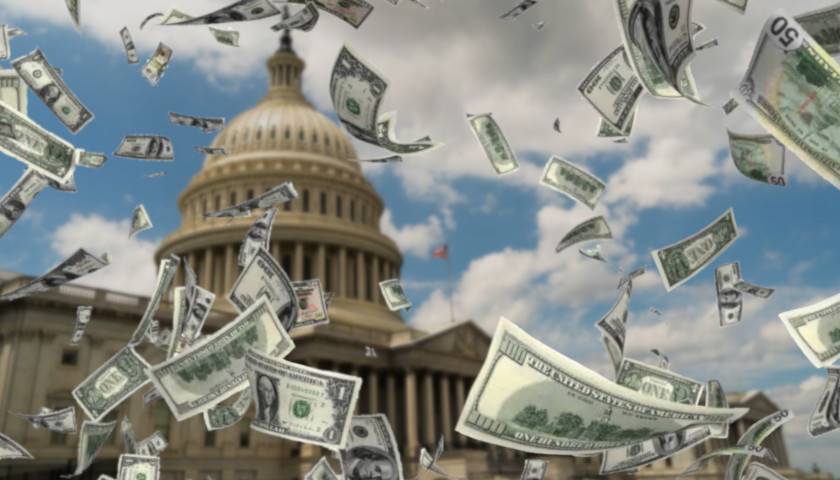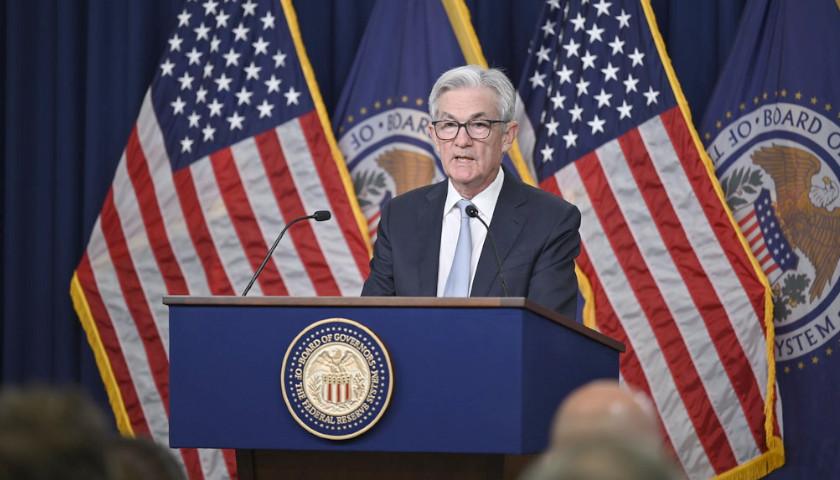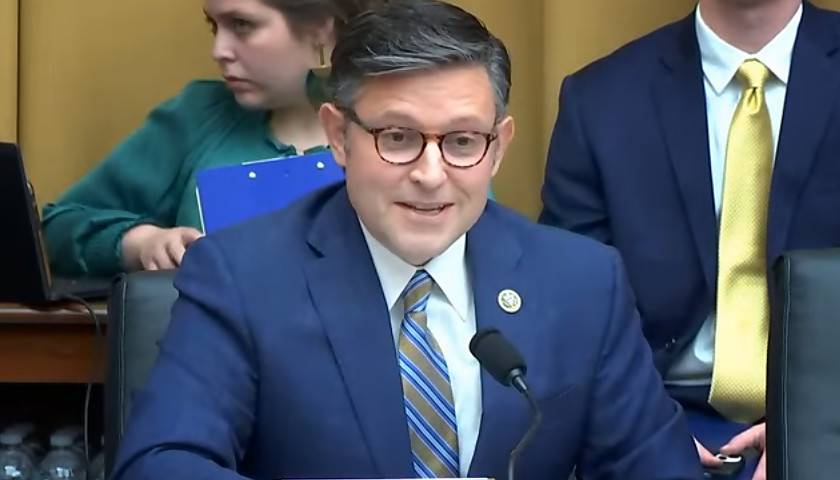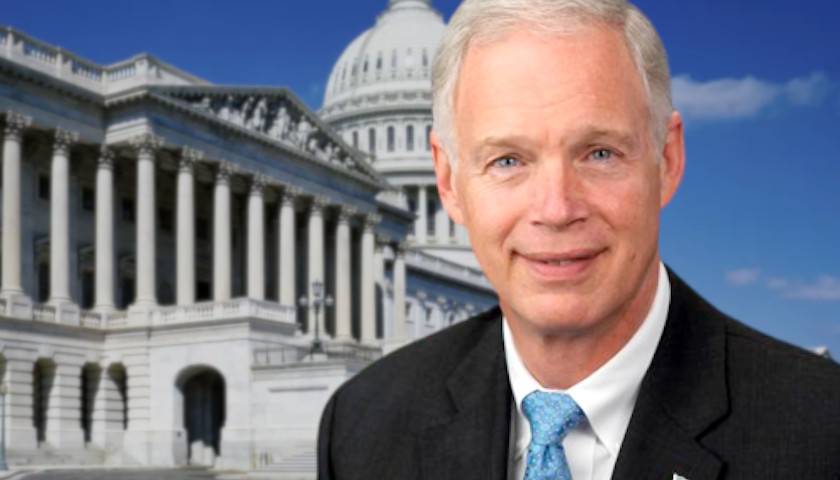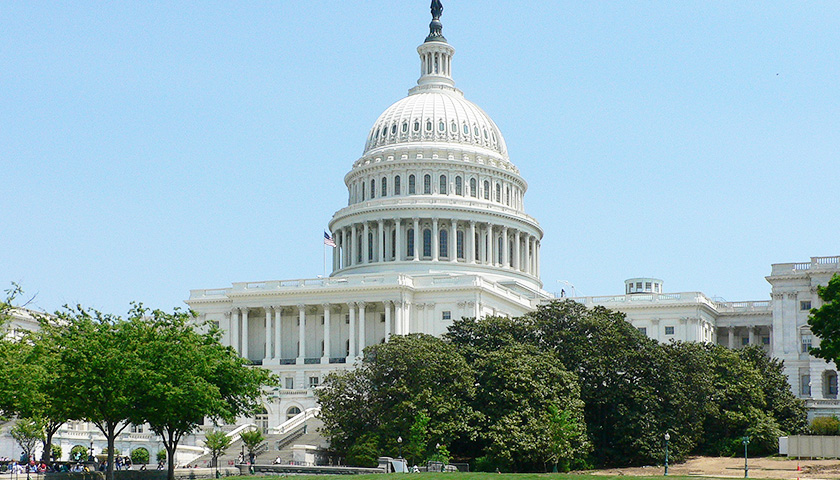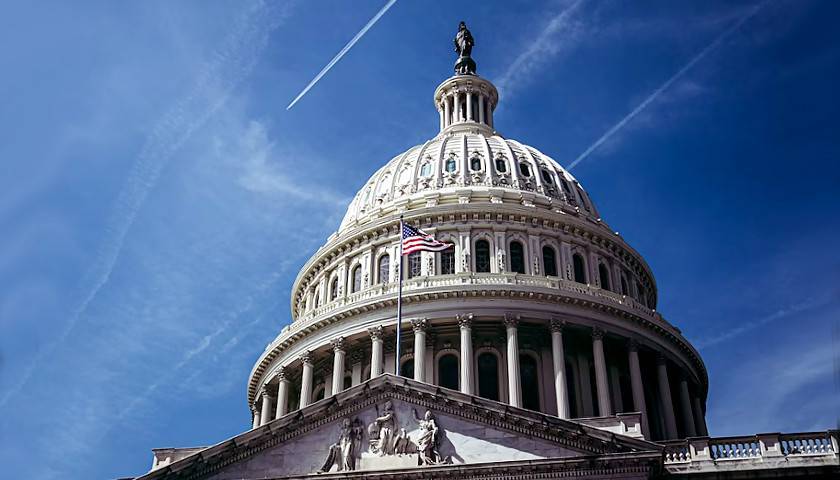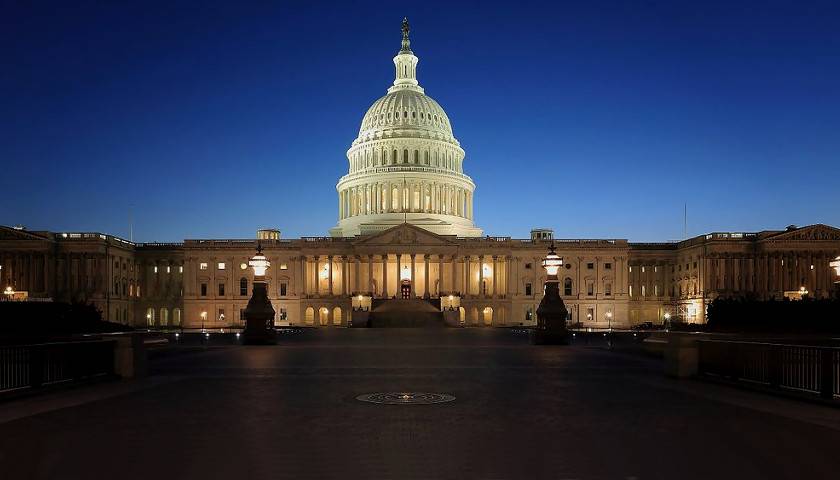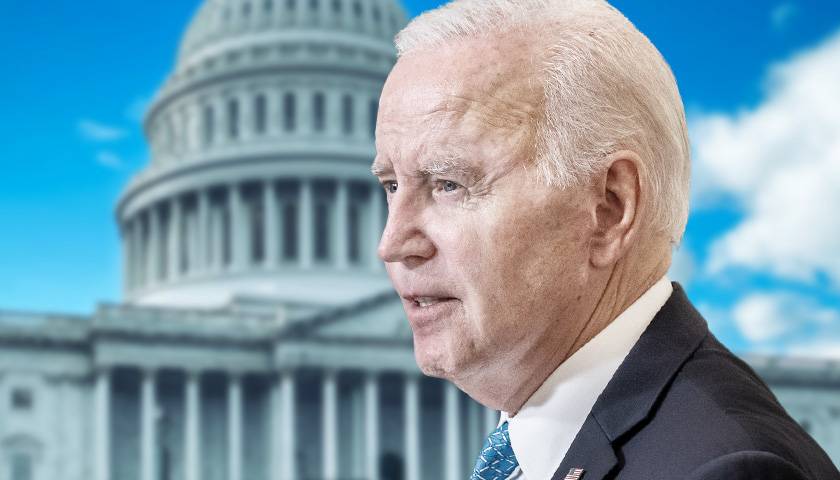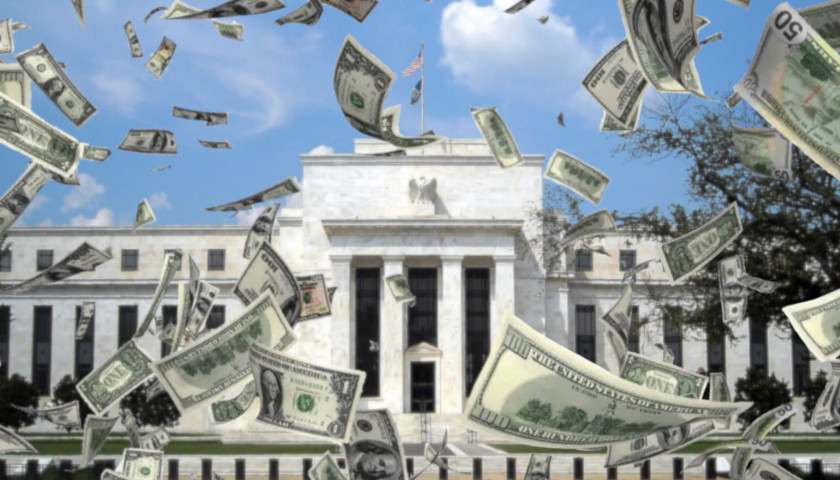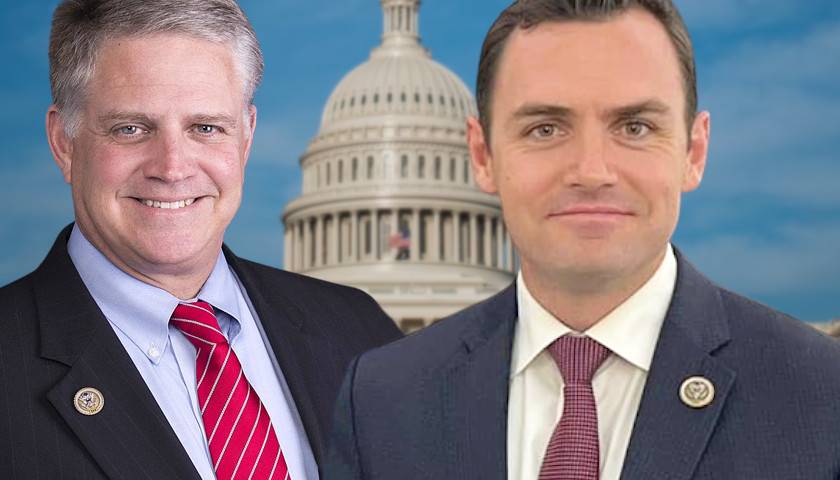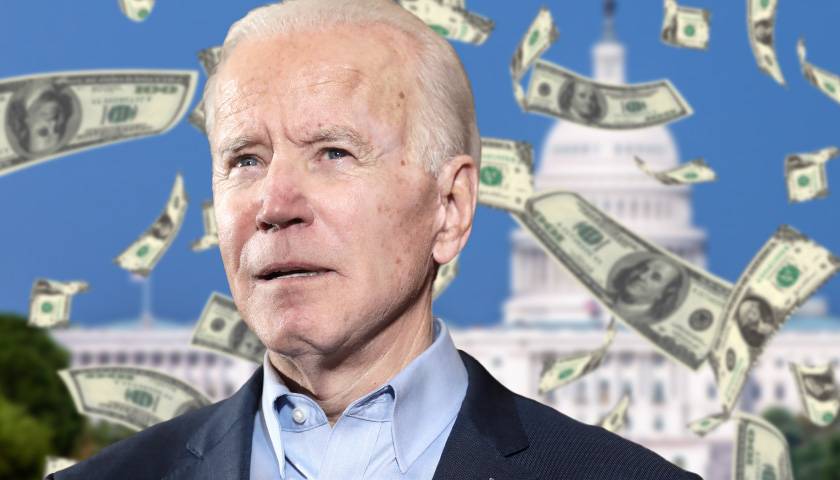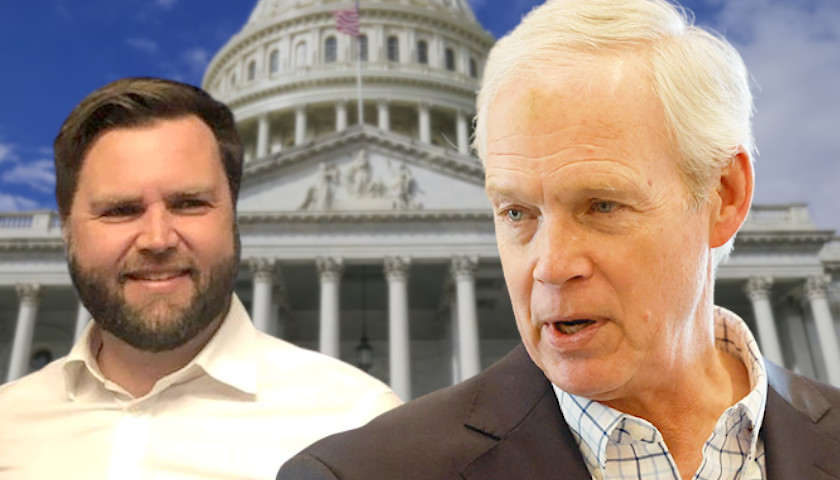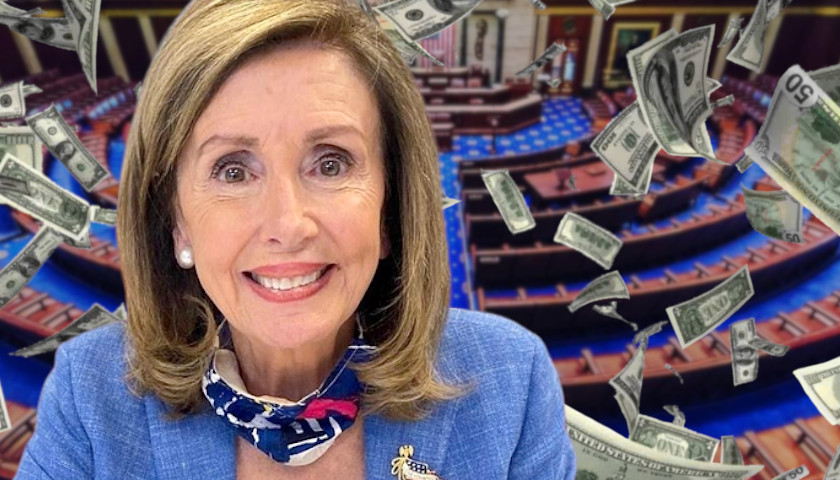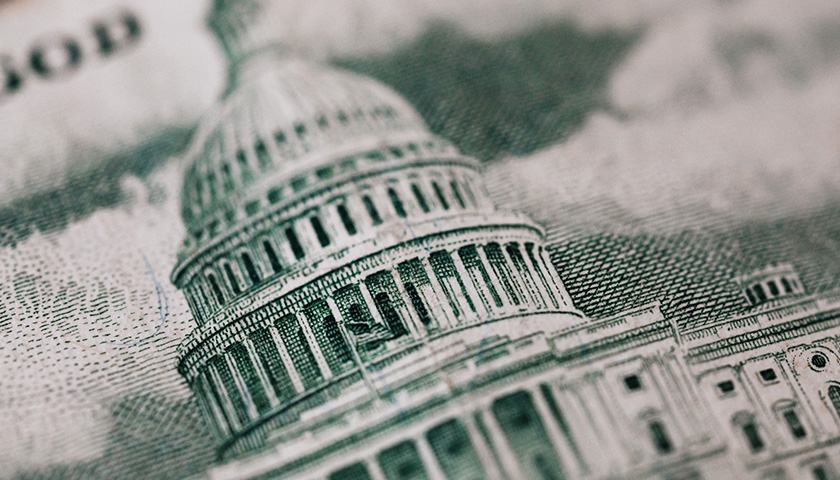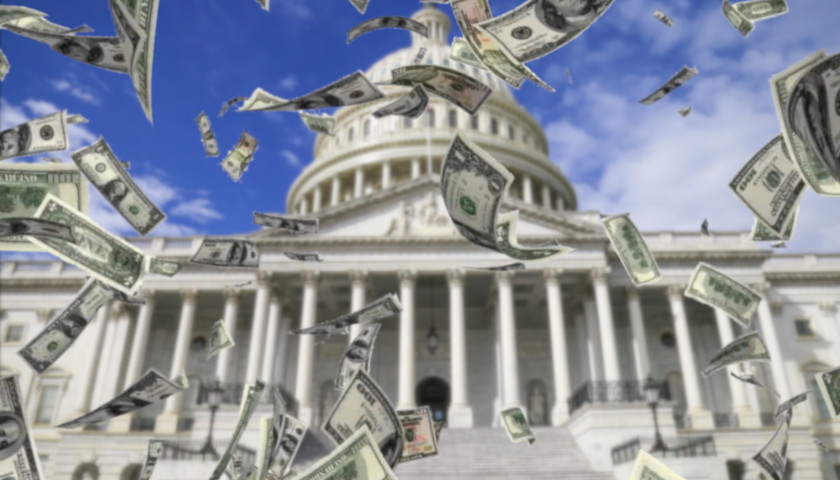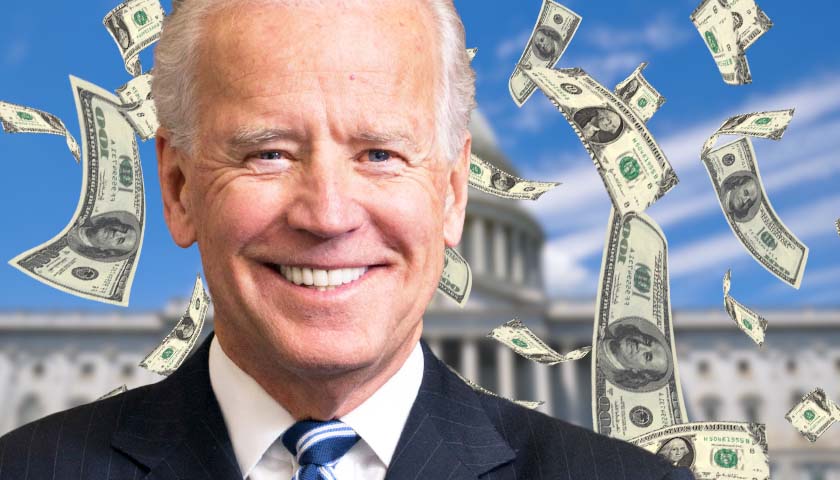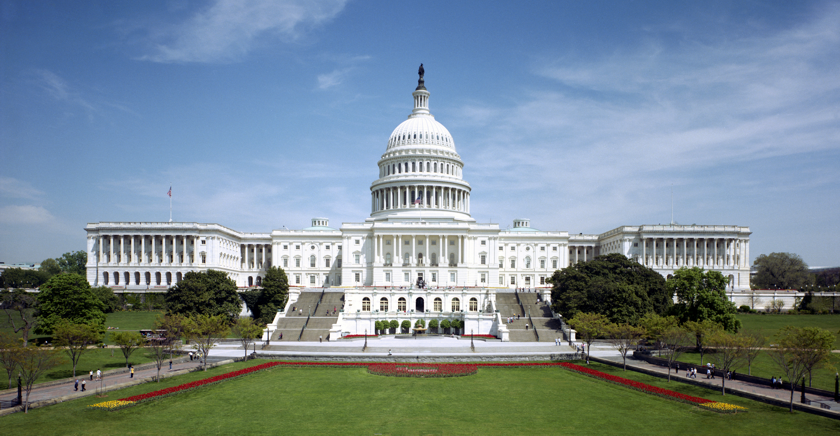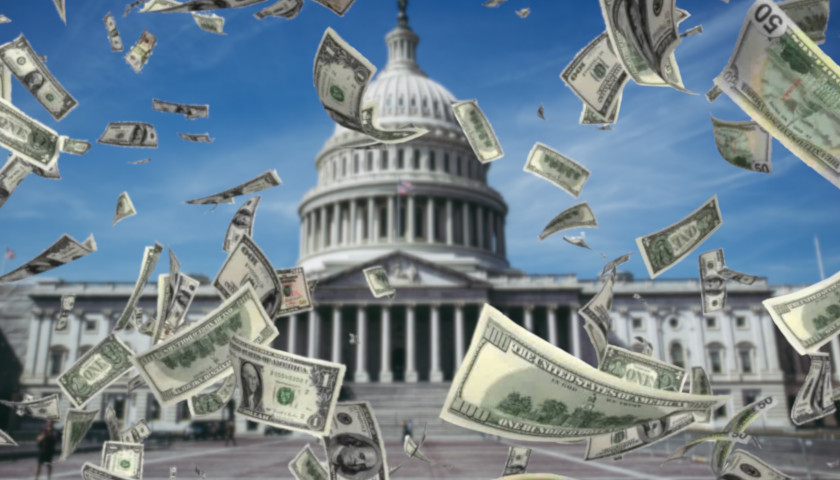The Republican majority in the United States House of Representatives is now planning to vote on a stopgap spending bill that will not include a critical election integrity measure that conservatives have been desperately trying to pass.
Read MoreTag: debt
Analysis: Federal Fiscal Burden Consumes 93 Percent of America’s Wealth
Based on data from a U.S. Treasury report, the federal government has amassed $142 trillion in debts, liabilities, and unfunded obligations. This staggering figure equals 93% of all the wealth Americans have accumulated since the nation’s founding, estimated by the Federal Reserve to be $152 trillion.
Unlike other measures of federal red ink that cover an arbitrary period, extend into the infinite future, or ignore government resources, the figure of $142 trillion applies strictly to Americans who are alive right now and includes the government’s commercial assets. Thus, it quantifies the financial burden that today’s Americans are leaving to their children and future generations.
Read MoreFederal Reserve Declines to Cut Rates Yet Again as Americans Wait for Relief
The Federal Reserve announced on Wednesday that it will not yet cut its benchmark federal funds rate in what is predicted to be the last in a streak of pauses as inflation and debt continues to cripple Americans.
Read MoreCommentary: Congress Should Support Site-Neutral Reforms
The recent Health Equity Report by BlueCross BlueShield of Tennessee offers a glimpse into the health challenges faced by Tennesseans. Among many concerning statistics, one stands out: 100 people are diagnosed with cancer in the state every day.
Sadly, the financial toll of chronic illnesses like cancer is staggering. It can saddle seniors, families and patients across Tennessee with decades of debt. Nationwide, 23 million Americans are confronting the burdensome reality of medical debt, which can wreck credit scores, send seniors to debt collections, and thwart patients from getting the timely, quality care they need.
Read MoreCommentary: American Paralysis and Decline
“We can bear neither our diseases nor their remedies.”
So shrugged the ancient historian Livy (59 B.C.- A.D. 17) of the long decline of Roman national character that, in his age, finally ended the Roman Republic.
Read MoreCommentary: The Way to Be a Traditional Wife
More and more women are fearlessly declaring their desire to live more traditionally—to get married, have children, and create a family. Women all over the globe are waking up to the lie that we can “have it all.”
Of course, it takes work, planning, and cooperation to build a healthy marriage and a happy family. Many women might be deep into modern life before they realize it is not as fulfilling as advertised. But we can all change our path and learn to live out our values, no matter when we decide to change. Let’s discuss real, practical strategies for women who are looking to embrace traditional marriage and build a healthy family.
Read MoreAnalysis Ties Surge in Inflation to Increased Spending, Value of Debt
The U.S. government and those of other countries could be using higher inflation to lessen the value of growing public debt resulting from increased spending during the COVID-19 pandemic, according to a new analysis by a Harvard economist working with The Heritage Foundation.
The study covers government spending from 2020 through 2022, the high point of the pandemic, and looked at the U.S. and 20 other economies in the Organization for Economic Cooperation and Development, or OECD.
Read MoreImpeachment Inquiry Sharpens Focus on Millions in Loans to Biden Family
There are red flags aplenty: Loan repayments between Joe Biden and his brother; millions in promissory notes between Hunter Biden and a Democrat-donating Hollywood lawyer; and debt deals from Ukraine to China.
As the House impeachment inquiry heats up, investigators are increasingly focused on a trail of red ink that has become a recurring theme in evidence chronicling the first family’s finances.
Read MoreCommentary: Oh Great, Another ‘Debt Commission’
Recognizing the precarious plight of the nation’s fiscal situation, newly installed House Speaker Mike Johnson has called for a bi-partisan commission to study the nation’s debt. Everyone involved in federal fiscal policy for a length of time surely responded with some variation on, “Good grief, Charlie Brown.” Congress has formed and ignored innumerable such groups over many decades.
Read MoreCommentary: The Next House Speaker Must Reign In Spending as Debt Set to Top $50 Trillion by 2033
When it comes to restoring fiscal balance, the next Speaker of the House will have his or her work cut out for them, as the White House Office of Management and Budget (OMB) projects the national debt will balloon to $50 trillion from its current $33.5 trillion by 2033 amid the current retirement wave, as Social Security goes from $1.3 trillion to $2.4 trillion and Medicare spirals from $821 billion to $1.8 trillion annually — and beyond.
Since the debt grows by about 8 percent a year on average once recessions and wars are factored in (both appear imminent), $100 trillion won’t be much further away, by 2037 or so, assuming we don’t default. In this generation’s lifetimes, for sure, if not the Baby Boomers’ who left the gargantuan debt behind.
Read MoreDebt-Laden Companies Are Headed Toward Doom as Interest Rates Take Their Toll
Companies around the world could be in trouble in the first half of 2024 as the rising cost of debt due to heightened interest rates threatens a half-trillion dollar refinancing scramble, according to Reuters.
Businesses, particularly across Europe, the Middle East and Africa, that previously borrowed when rates were low and businesses that need to take out new loans to meet capital requirements need around $500 billion in the next half-year for refinancing to avoid cutting operations, according to Reuters, citing analysis from restructuring consultancy Alverez & Marsal. The value of company loans in the next six-month period is projected to be higher than any other similar period until the end of 2025, threatening businesses that will need to borrow during that time and risking corporate failures.
Read MoreWisconsin U.S. Senator Ron Johnson Pushes Shutdown Prevention Bill to End ‘Stupid Exercise’
Another game of shutdown chicken ended last weekend with the status quo and the ousting of House Speaker Kevin McCarthy.
U.S. Senator Ron Johnson (R-WI) says its time to end the senseless — and costly — practice of shutdown politics.
Read MoreCommentary: House Freedom Caucus Wants To Do Something About Out of Control Spending
On Monday, the House Freedom Caucus (HFC) struck a blow in the fight for fiscal displume. In a 431-word statement, the conservative House Republicans put Official Washington on notice that when Congress returned in September and took up the seemingly annual short-term spending bill known as a “Continuing Resolution,” the HFC would not vote to fund business as usual. Instead, HFC members would only support a short-term spending bill to keep the government open if it also included several of their key policy priorities – policy priorities that would represent significant shifts in key areas of government policy.
Read MoreSenate Passes Compromise Debt Deal to Avert Default
The U.S. Senate on Thursday evening passed a compromise deal to suspend the debt ceiling until after the presidential election while capping the rate of spending growth in subsequent years.
Read MoreHouse Passes Compromise Deal to Suspend Debt Ceiling, Cut Spending
The House of Representatives on Wednesday evening passed a bipartisan deal to suspend the debt ceiling and cut spending ahead of a June 5 deadline to avert a national default.
Read MoreCommentary: Any Debt ‘Default’ Will Be Biden’s Choice
There’s enough revenue to pay interest on the debt even if the $31.4 trillion debt ceiling is reached.
Meaning, if the U.S. defaults on the debt on June 1, it will be because President Joe Biden chose not to make principal and interest payments on U.S. Treasuries out of existing revenue, for which there is more than ample revenues to service and refinance up to the current debt ceiling limit, $31.4 trillion.
Read MoreCommentary: The Interest Alone on the National Debt Will Hit $1 Trillion in 2024 as Reserve Currency Status Is Questioned
Gross interest owed on the $31.4 trillion national debt — that is, interest owed on both the $24.9 trillion publicly traded debt and the $6.7 trillion debt in the Social Security, Medicare and other trust funds — will reach a gargantuan $1 trillion in 2024 for the first time in American history, according to the latest data gathered by the White House Office of Management and budget.
To put that into perspective, that is more than is spent on national defense related spending, currently $814 billion.
Read MoreHouse Bill Would Block Biden’s Student Loan Bailout
While the constitutionality of President Joe Biden’s student loan bailout is awaiting a Supreme Court decision, a bill re-introduced by two House members would block the Biden administration from canceling student loan debt on a mass scale.
The Student Loan Accountability Act, authored by U.S. Representatives Mike Gallagher (R-WI-08) and Drew Ferguson (R-GA-03) would also prevent forgiven loans from getting an additional tax break and it would bar the Internal Revenue Service from sharing American’s tax information for the purpose of implementing mass loan cancelation.
Read MoreU.S. Household Debt Rises Sharply
Household debt across the country is sharply on the rise, with U.S. households now collectively on the hook for about $17 trillion in total. The average family holds about $142,680 in debt, according to a new WalletHub report.
All told, the personal finance website concludes that 2022 ended with Americans roughly $320 billion more in total debt than they were at the start of the year. During the fourth quarter alone, consumers added at least $398 million in new debt, the fourth highest build-up for a fourth quarter over the past two decades and more than four times larger than Q4 2021.
Read MoreCommentary: The State of the Debt
When Joe Biden delivers the State of the Union Address on Tuesday night, at least three things seem pretty certain. He’ll suggest America is now in its Golden Age, no doubt begun sometime in late January 2021. He’ll offer a laundry list of new things on which he’d like to have the government spend Americans’ hard-earned money. And he won’t say a thing about how we’re now $31.4 trillion in debt—roughly triple the $10.6 trillion tally from when Biden became vice president just 14 years ago.
Read MoreFiscal Hawks Warn Biden: No Debt Ceiling Deal Without Fiscal Reforms
The fiscal hawks are sticking to their guns. On Friday, Sens. Ron Johnson (R-WI) and J.D. Vance (R-OH) joined 22 of their fellow Republican senators in a letter warning President Joe Biden that they will not vote for increasing the debt ceiling without structural reforms to the federal government’s budget and debt problems.
Read MoreCommentary: Nancy Pelosi’s Other Legacy Is a Mountain of Debt for Our Children
House Speaker Nancy Pelosi officially stepped away from leadership last week after two decades directing the political agenda of House Democrats.
There’s no denying the historic nature of the California lawmaker’s tenure, whose leadership began in 2002 when she became the first woman elected House minority whip. She’d go on to take up the gavel of House speaker twice (from 2007–2011 and 2019–2023), making her the only female House speaker in history and one of a few to serve nonconsecutive terms.
Read MoreHouse Speaker Fight Foreshadows Larger Debt Ceiling Battle on the Horizon for Republicans
The gridlock that paralyzed House Republicans over the past week in their quest to elect a new Speaker could be a foretaste of more to come, with party moderates and conservatives set to tangle in the months to come over raising the debt ceiling and reining in reckless government spending.
Although newly elected Speaker of the House Kevin McCarthy ultimately prevailed in his bid for the office over a small but determined band of House Freedom Caucus members, his slim GOP majority in the House will be vulnerable if and when conservatives rebel again down the road, as some are predicting, in an effort to reassert debt reduction as a top priority for the party.
Read MoreCommentary: Don’t Give an Inch on the Debt Ceiling
The dust has barely settled from the contentious midterms, and the battle lines are already being drawn for the next legislative fight in Washington: the debt ceiling. With the nation at unprecedented levels of indebtedness, the choice in this fight is a stark one: a path toward stability or fiscal Armageddon.
If that sounds hyperbolic, consider the following facts about America’s finances.
Read MoreGOP Governors to Biden: Student Loan Plan Will Be Costly for American Taxpayers
President Joe Biden’s student loan forgiveness plan will be costly for American taxpayers, a coalition of GOP governors said in a letter sent Monday to the White House.
The letter, signed by 22 GOP governors, tells Biden to “withdraw” the plan, citing cost estimates of up to $600 billion, or $2,000 per American taxpayer.
“As governors, we support making higher education more affordable and accessible for students in our states, but we fundamentally oppose your plan to force American taxpayers to pay off the student loan debt of an elite few,” the coalition wrote.
Read MoreCongressional Budget Office: Debt to Surpass GDP at Record Level over Next Decade
The Congressional Budget Office released its economic outlook for the next decade and projected record high debt levels compared to the nation’s Gross Domestic Product.
The CBO projected a decrease in the deficit compared to the major COVID-era spending spree that helped fuel inflation to its current high levels.
Read MoreCommentary: America’s Phony Debts Problem
The email from “Norton Protection” said I owed $999.99, which was “charged successfully and it will appear on your bank statement in 24 to 48 hours.” Although I have an account with a leading cybersecurity company, I’ve never paid that much for its products. To “cancel” the charge, I was instructed to call a number, conveniently highlighted in yellow.
All it took to bird-dog my fake debt email was a simple search-engine query of the invoice’s telephone number. It was based in Hawaii. Unfortunately, perhaps, for the real employees of Norton’s help desk, they are likely not stationed in the Aloha State.
In a nation swimming in real debt – with the average American owing an estimated $90,000 – it’s not surprising that “phantom debts” are one of the hottest scams.
Read MoreCommentary: The Treacherous Road to Runaway Inflation
In January, 2001, America had a balanced budget, low debt, and was at peace. Here, briefly, is what lay ahead: war, financial crisis, civil unrest, massive growth of the federal government, and now severe inflation.
Never in the history of America has our government in its ineptitude created such a false economy, risking hundreds of years of hard work on unsound and unworkable economic policies. The Founders wisely relied on dispersion of power. They knew there would be dishonest and incompetent politicians but, in this case, the entire government is infected with deceptive leaders.
Read MoreNewt Gingrich Commentary: The Higher Inflation and Bigger Debt Act
The $3.5 trillion spending bill set up to follow the $1.1 trillion infrastructure bill (which has little to do with infrastructure) should be called what it really is: The Higher Inflation and Bigger Debt Act.
The Democrats would like you to believe it is only a reconciliation bill. This is vital to them because a reconciliation bill only takes 50 senators and the vice president to pass the U.S. Senate.
However, this additional $3.5 trillion comes after trillions of emergency spending prompted by the COVID-19 pandemic. Consider what the Congressional Budget Office has written about the fiscal situation before the $1.1 trillion and $3.5 trillion bills are passed:
Here is what the Congressional Budget Office forecasts (not counting Biden’s enormous spending plan):
“By the end of 2021, federal debt held by the public is projected to equal 102 percent of GDP. Debt would reach 107 percent of GDP (surpassing its historical high) in 2031 and would almost double to 202 percent of GDP by 2051. Debt that is high and rising as a percentage of GDP boosts federal and private borrowing costs, slows the growth of economic output, and increases interest payments abroad. A growing debt burden could increase the risk of a fiscal crisis and higher inflation as well as undermine confidence in the U.S. dollar, making it more costly to finance public and private activity in international markets.”
Read MoreThe Congressional Budget Office Says the Bipartisan Infrastructure Bill Will Increase Deficits by $256 Billion over 10 Years
The Congressional Budget Office estimated Thursday that the bipartisan Senate infrastructure bill will add $256 billion to the deficit over the next decade, undercutting its backers’ claims the spending had been offset.
In FY2020, the deficit hit a record $3.1 trillion. So far in FY2021, the deficit is $2.2 trillion. The national debt is climbing to $29 trillion for the first time in U.S. history.
Read MoreCommentary: Taxpayers End up Paying off the Insane Tuition Costs of Grad Programs at Elite Colleges
“Columbia and other wealthy universities steer master’s students to federal loans that can exceed $250,000. After graduation, many learn the debt is well beyond their means,” notes the Wall Street Journal.
The Journal reports on Columbia University’s Master of Fine Arts Film program, one of the worst examples, in an article titled “Financially Hobbled for Life: The Elite Master’s Degrees That Don’t Pay Off”:
Recent film program graduates of Columbia University who took out federal student loans had a median debt of $181,000.
Read MoreBiden’s ‘American Jobs’ Plan Could Cost Taxpayers about $666,000 per Job Created
President Joe Biden’s proposed $2 trillion American Jobs Plan could end up costing taxpayers more than $666,666 per job created.
The Washington Post gave Biden “two Pinocchios” for saying the American Jobs Plan, his infrastructure and jobs proposal, will create 19 million jobs. Both Biden and his Transportation Secretary Pete Buttigieg have made the 19 million jobs claim. The source of the statement is a Moody’s analysis, which CNN pointed out had estimated the U.S. economy would add about “16.3 million jobs over the same period if the infrastructure proposal does not get passed.”
Read MoreCommentary: China Needs to Pay Its Debts to Us
These decisive words from Donald Trump’s 2017 inaugural speech will shape American political discourse for decades to come:
Read MoreCommentary: Debt Is the Most Predictable Crisis in U.S. History
Former Treasury Secretary Henry Paulson issued a stern warning in last week’s Wall Street Journal: “A world-class financial system can’t exist in a country that fails to maintain the quality of its credit.”
America’s debt problem was already wildly out of control for the past 20 years, but we now face truly unprecedented additional levels of debt issued by Congress in response to the pandemic. From 2000 to 2019, the federal debt rose from $5.6 trillion to $22.7 trillion, and it is expected to top $27 trillion by year’s end, a whopping 19 percent increase this year. Another trillion in virus relief spending now seems to be at the low end of spending estimates going into 2021.
Read MoreMajority of Voters Believe U.S. Debt Will Pave the Way for China to Become Global Financial Leader
Amajority of voters believe that the United States’s increasingly growing federal debt will hinder the county’s prospects in the future and position China as the next global financial center, according to a new Just the News Daily Poll with Scott Rasmussen.
Read More
